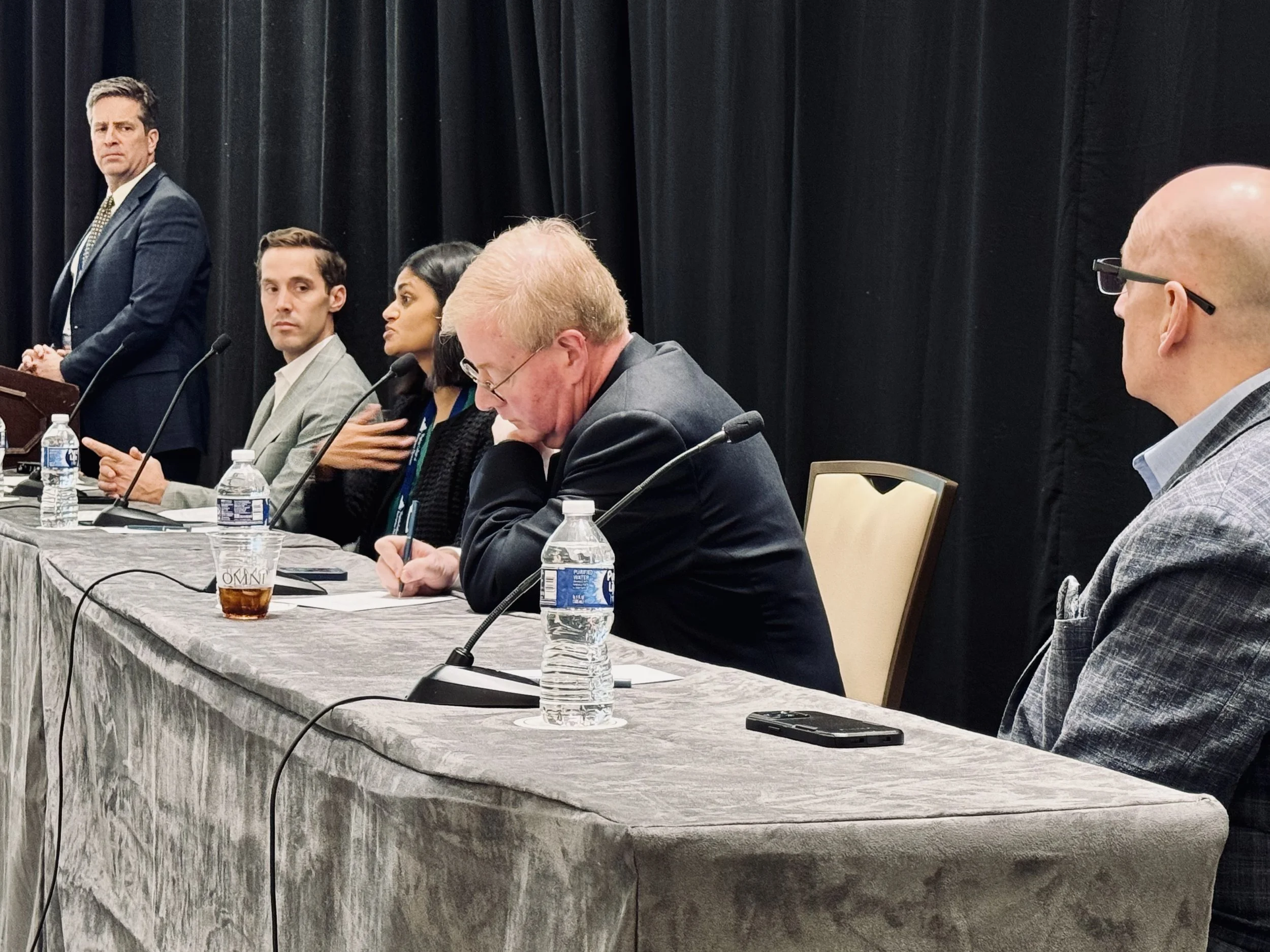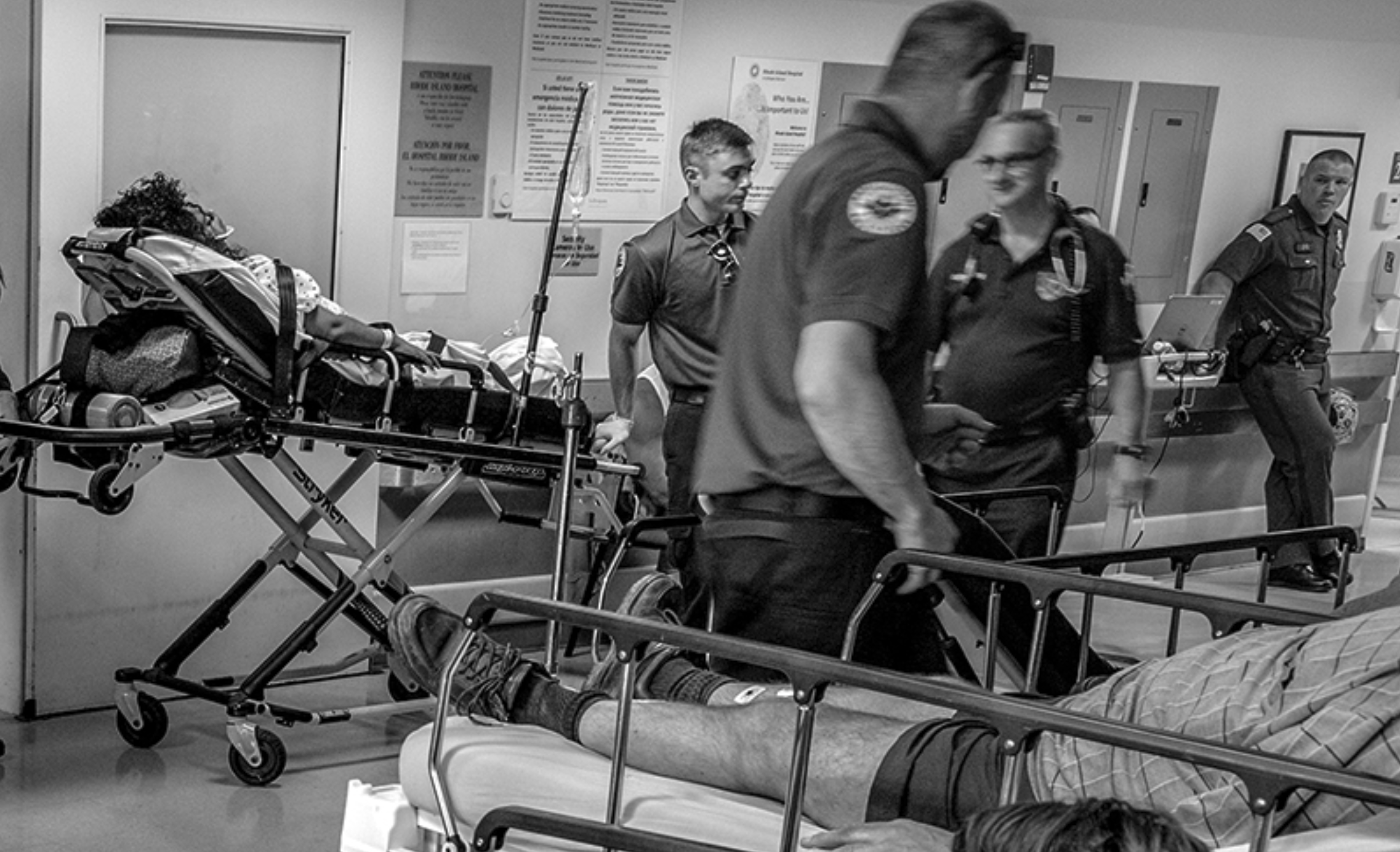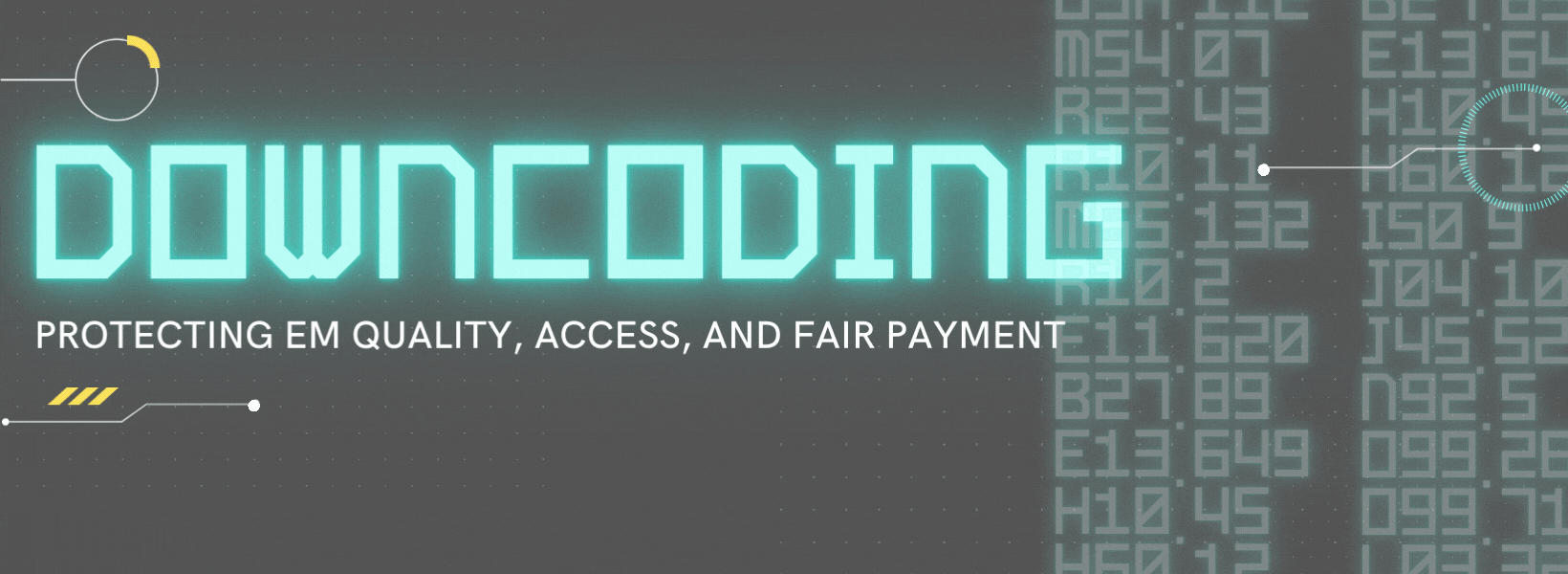Wins, Compromises, and Losses: VACEP '24 Legislative Panel Recap
Virginia and national EM leaders give updates and insights into 2024 General Assembly bills, plus new lawsuit to claw back three years of downcoded Medicaid reimbursements
ACEP Board member Jeffrey M. Goodloe, MD, FACEP speaks as part of the 2024 Legislative Update Panel at VACEP ‘24. Also pictured (from left): VACEP immediate past-president Todd Parker, MD, FACEP; VACEP president Jesse Spangler, MD; VACEP president-elect Joran Sequeira, MD; and L. Anthony Cirillo, MD, FACEP, who leads government affairs for USACS and serves on the ACEP Board.
Some wins. Some compromises. And a loss.
That will be the outcome for emergency medicine in the Virginia General Assembly as it heads toward adjournment in two weeks.
And that was the message delivered on Saturday at the VACEP 2024 Annual Conference, where College leaders briefed attendees on key bills and issues tackled by lawmakers this year in Richmond. Two Board members from the American College of Emergency Physicians also took part in the legislative update panel and offered a national analysis on Virginia’s actions.
Here’s what the group covered.
Keeping physicians physically in ERs 24/7
VACEP introduced and was able to pass bills requiring a physician (not necessarily an emergency physician) be physically present in the ER at all times. Current Virginia law requires hospitals to have a licensed physician on call, though not necessarily physically present and on the premises in the ER. The bills are HB 353 (Hope) and SB 392 (Pekarsky).
NURSE PRACTITIONERS WILL GAIN INDEPENDENT PRACTICE AFTER ONLY 3 YEARS TRAINING
Virginia nurse practitioners this year sought to expand their scope and gain autonomous practice in less time than existing law allows. They succeeded, with some guardrails.
HB 971 (Tran) passed and is on the way to the Governor’s desk for signing. It will change the training requirements for independent practice for NPs from five years/9,000 hours to three years/3,600 hours. NPs had originally requested just two years training.
VACEP was the only medical group to oppose the bill and push for the existing five-year standard. Why? Because physicians are not allowed to practice without supervision after they graduate from medical school and must complete 12,000-20,000 hours of post-graduate proficiency training and 3-4 year residency.
“You don't learn how to be a doctor in medical school, you become one in residency,” said Todd Parker, MD, VACEP’s immediate past-president. “Nobody should be practicing independently without an equivalent physician training.”
Similarly:
No leading teams: A separate bill, HB 983 (Walker), would have allowed NPs to lead a patient care team. It was defeated as part of a compromise to require three years training for NPs to practice independently.
No CRNA independent practice: Certified registered nurse anesthetists (CRNAs) sought to eliminate a requirement that they practice under supervision of a licensed doctor of medicine, osteopathy, podiatry, or dentistry and instead practice “in consultation with” those physicians. HB 1322 (Sickles) died in a Senate subcommittee. VACEP supports Senate Bill 33 (Locke), which would clarify that CRNAs be supervised by a licensed physician who is present during an operation or procedure. The bill would convene a work group of relevant stakeholders to evaluate and make recommendations to increase the anesthesia provider workforce in the Commonwealth. It was continued to 2025.
Advanced Practice Registered NurseS CONTINUE UNDER JOINT BOARDS
Currently, professions of advanced practice registered nurses and licensed certified midwives are licensed and jointly overseen by the Board of Medicine and the Board of Nursing. HB 978 (Willett) and SB 351 (Boysko) were defeated this year in the House and Senate. They would have abolished the joint board and put all oversight under the Board of Nursing only.
Abolishing the joint board in Virginia would allow these practitioners to become part of the APRN Compact, which gives advanced practice registered nurses (APRNs) one multi-state license with the ability to practice in all Compact states.
The Compact requires those providers to be governed solely by a Board of Nursing. And it supersedes all other state law regarding scope of practice and allows practice after only one year of training.
MENTAL/BEHAVIORAL HEALTH BILLS
Several bills would have impacted emergency departments caring for patients having mental and behavioral health emergencies.
HB 808 (defeated): Would have allowed state psychiatric hospitals to delay admission of an individual under a temporary detention order (TDO) until the hospital has determined the person does not have potentially life-threatening medical needs that require immediate evaluation and treatment, but the facility is incapable of providing. The bill was a recommendation of the Joint Legislative Audit and Review Commission and the Behavioral Health Commission.
SB 546 (amended): Allows access of family members to patients under emergency custody order or TDO while in the emergency department or hospital. VACEP fought for an amendment, which was included, giving emergency physicians the right to prevent family members from seeing patients if their presence would create a medical, clinical, or safety risk to the patient or provider, or interferes with care. “It can be a decision made with our nursing staff to decide whether it is the best thing for a patient. We are reasonable people and we do allow family members to come back when it is good for the patient,” said VACEP president-elect Joran Sequeira, MD, who is involved in several state behavioral health projects.
Senate Bill 34 (defeated): A pilot program that would have allowed trained individuals in a Hampton Roads psychiatric emergency department to obtain a TDO instead of a Community Services Board. VACEP was concerned the pilot program would expand to all Virginia emergency departments, not just psychiatric ones.
MEDICAL MALPRACTICE CAPs remain
A bill to eliminate the medical malpractice cap against healthcare providers in cases where the patient is age 10 or younger was defeated. The cap is currently $2.6 million.
Years ago, Virginia medical groups and trial lawyers agreed to $50,000 annual increases in medical malpractice caps each year until 2031, when the cap will be $3 million. These caps apply to all medical malpractice claims in the state for cases that are resolved through trial by jury or judge.
“I will say, when you hear the arguments of three- or four-year-olds who are the victims of truly horrible negligence and malpractice, you feel for the families that are incurring millions and millions of dollars of expenses caring for the results of this throughout the remainder the person's life,” Parker said.
He added that VACEP is open to finding a compromise and raising the standard for suing physicians from simple to gross negligence. “In exchange for raising the standard and making it much harder to sue physicians, we would potentially agree to an increase in the cap. There are people who are truly harmed, horribly, by terrible negligence.”
DOWNCODING
While not a bill in the General Assembly, VACEP continues to fight the impacts of a 2020 Virginia budget amendment that inappropriately and automatically cut Medicaid reimbursements for certain emergency department visits if the patient’s diagnosis fell on a list of 800 emergency conditions — many of them common and acute. Reimbursements were automatically cut to about $16 per visit under this “Downcoding” policy.
In April 2023, after years of legislative attempts and a federal lawsuit filed by VACEP and our allies, the policy was ruled by a federal judge to be in violation of federal law and the prudent layperson standard. The Virginia Department of Medical Assistance Services (DMAS), the state agency in charge of Medicaid as well as Medicaid MCOs, has since worked to reimburse providers at the full rates for claims submitted after April 27, the day the federal ruling went into effect.
But the Downcoding provision itself went into effect in July 2020 — over three years before legal decision, resulting in millions of dollars of reduced payments to emergency physicians. VACEP believes that, since the policy was vacated, the program was never properly implemented, and all Downcoding since the start was unauthorized.
Now, VACEP has filed a second lawsuit against the state, demanding DMAS pay for Medicaid visits over those three years of reduced payments. VACEP believes strongly in the merits of the case to not only recoup lost reimbursements, but set a significant precedent in Virginia — and nationwide.
In fact, there is already a nationwide precedent: Kansas. Its Medicaid program implemented an identical downcoding policy in 2017, and the Centers for Medicare and Medicaid Services ruled the policy in violation of federal law. This was a significant part of our original lawsuit, and one of the reasons the Virginia federal judge last year found CMS's approval of the Virginia program "arbitrary and capricious.” A second, critical part of the Kansas ruling was that CMS also required the Kansas Medicaid program to reimburse all downcoded claims as of the date of program implementation, not the date the program was ruled in violation of law.
A hearing on the VACEP lawsuit is set for May 2.
ADDITIONAL BILLS
HB 519 (Mundon King): Would prohibit disciplinary or legal action against providers who provide abortion-related care in Virginia (for example, a Virginia physician who provides such care to a patient from a state where those rights are restricted). It has passed House and Senate committees. VACEP’s position is to advocate for care that we are ethically and legally required to provide under EMTALA.
HB 87 (Green): Would require EDs to test all patients presenting with suspected overdose for fentanyl, marijuana, amphetamines, opioids, and PCP. It was defeated. VACEP generally opposes bills that attempt to legislate the clinical practice of medicine.
HB 964 (Willett): Allows the Executive Director of the Board of Medicine to be an attorney. It passed the House and Senate. VACEP is against this bill.
SB 360 (VanValkenburg): Would have prevented employers from entering into non-compete covenants with healthcare providers. But what began as a bill specific to healthcare was amended to include other professions. The bill died.
Have a look at all the bills VACEP is tracking in the 2024 General Assembly.









